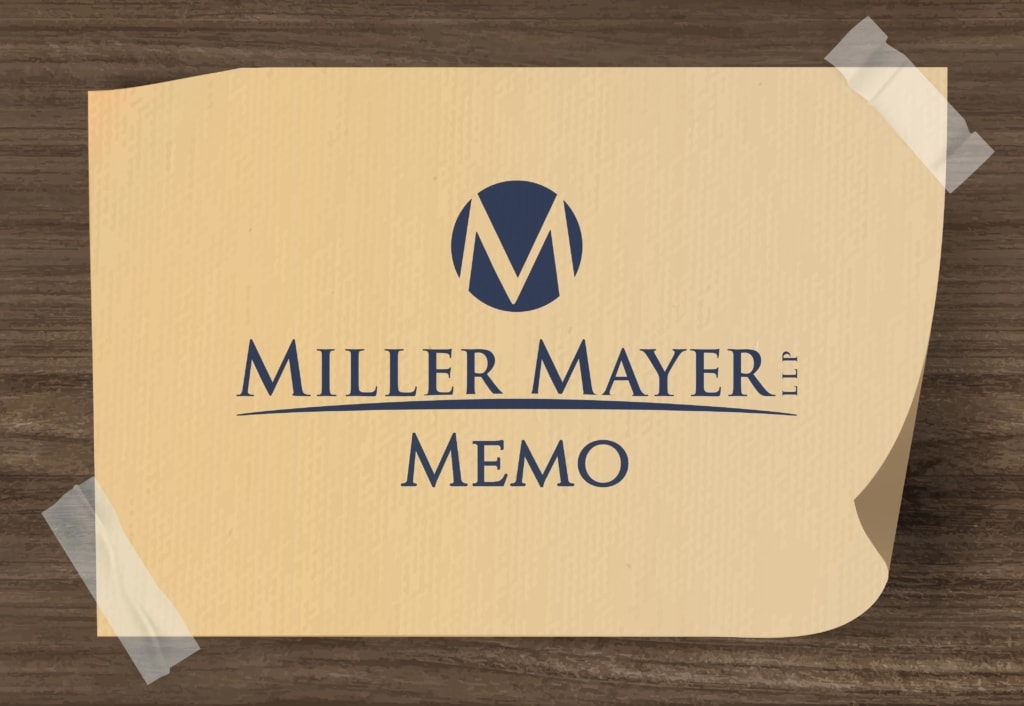
This week we are introducing our new blog series “Miller Mayer Memo,” where we’ll discuss trending immigration topics. Our first post discusses the controversial public charge rule, and we’ll discuss this topic further during a webinar on February 6th. Please visit http://www.millermayer.com/webinars to register.
Controversial ‘Public Charge’ Rule: What You Need to Know
In August 2019, the Trump administration issued a new final rule expanding the definitions of “public charge” and “public benefit” for inadmissibility determinations, which was to have taken effect in October but has proved controversial. Several states and advocacy groups filed lawsuits challenging the final rule, and courts have stopped it at least temporarily from taking effect.
Information about public benefits for immigrants, highlights of the rule, the challenges, and the outlook are summarized below.
The “public charge” ground of inadmissibility. The U.S. immigration statute has nearly 30 grounds of inadmissibility, meaning that people subject to those grounds can’t enter or stay in the United States. One ground of inadmissibility is called “public charge,” which means foreign nationals can’t enter or remain in the United States if they rely too heavily on government assistance.
Over the years the immigration agency generally interpreted “public charge” narrowly, so that only people who relied on certain cash benefits for income maintenance were deemed inadmissible. That changed in October 2018, when U.S. Citizenship and Immigration Services (USCIS) proposed changes to broaden who would be inadmissible as a public charge. USCIS received over 266,000 comments on the proposed changes, most of them negative. Nevertheless, the agency finalized its proposal in August 2019.
Final Rule. The overall emphasis of the 217-page final rule, with certain exceptions, is on whether a person is likely to use (or has used) various forms of public assistance. According to the rule, public benefits considered in public charge inadmissibility determinations generally include:
- Any federal, state, local, or tribal cash assistance for income maintenance
- Supplemental Security Income (SSI)
- Temporary Assistance for Needy Families (TANF)
- Federal, state or local cash benefit programs for income maintenance (often called “General Assistance” in the state context, but which may exist under other names)
- Supplemental Nutrition Assistance Program (SNAP, formerly called “Food Stamps”)
- Section 8 Housing Assistance under the Housing Choice Voucher Program
- Section 8 Project-Based Rental Assistance (including Moderate Rehabilitation)
- Public Housing under section 9 of the Housing Act of 1937
- Federally funded Medicaid (with certain exclusions)
Among other things, the final rule makes nonimmigrants who have received designated public benefits for more than 12 months in the aggregate within any 36-month period since obtaining the nonimmigrant status they seek to extend or from which they seek to change “generally ineligible for change of status and extension of stay.”
USCIS said that while most lawful permanent residents are not subject to inadmissibility determinations, including public charge inadmissibility, some lawful permanent residents can be subject to the public charge ground of inadmissibility upon their return from a trip abroad because “specific circumstances dictate that they be considered applicants for admission.”
The agency noted that in limited circumstances, and in the agency’s discretion, a person who wants to adjust status may post a bond and obtain adjustment despite being determined inadmissible on public charge grounds. The final rule sets the minimum bond amount at $8,100; USCIS explained that the actual bond amount would depend on the person’s circumstances. Also, in certain cases, a person may obtain a waiver of the public charge ground of inadmissibility.
Certain classes of immigrants are exempt from the public charge ground of inadmissibility, including refugees, asylees, and Afghans with special immigrant visas (e.g., interpreters for the U.S. military in Afghanistan). U and T visa holders are also exempt.
Challenges. Various states and advocacy groups sued to block the rule from taking effect. Most recently, in December 2019, two U.S. Courts of Appeals (Fourth and Ninth Circuits) granted the government’s motion for a stay of preliminary injunctions granted by two District Courts (Northern District of California and Eastern District of Washington). There is related litigation before several other U.S. Courts of Appeals (Second and Seventh Circuits), and the Department of Homeland Security remains bound by a nationwide injunction preventing the rule from taking effect until pending litigation is resolved, and other injunctions limited to specific states.
Outlook. It remains to be seen whether subsequent courts will rule in favor of or against the rule, as well as what impact a potential change in administration will have. To help you understand the new public benefits rule and its possible impact on you, Miller Mayer attorneys Kristal Ozmun and Stephen Yale-Loehr will hold a free webinar on February 6 at 2 pm Eastern time. Register for the webinar here: http://www.millermayer.com/webinars
More information:
- USCIS public charge page, https://www.uscis.gov/greencard/public-charge
- USCIS details on the final rule and related law, https://www.uscis.gov/legal-resources/final-rule-public-charge-ground-inadmissibility
- USCIS announcement of court developments, https://www.uscis.gov/news/news-releases/judicial-victories-public-charge-cases-give-trump-admin-confidence-implementation-long-standing-law
- Catholic Legal Immigration Network, Inc., summary of the final rule, https://cliniclegal.org/resources/ground-inadmissibility-and-deportability/public-charge/dhs-finalizes-public-charge-rule
- American Immigration Lawyers Association summary of public charge changes at several federal agencies, https://www.aila.org/advo-media/issues/all/public-charge-changes-at-uscis-doj-and-dos
- NPR news article on courts blocking public charge rule, https://www.npr.org/2019/10/11/769376154/n-y-judge-blocks-trump-administrations-public-charge-rule
- S. Immigration Policy Center report on the impact of the public charge rule on undocumented immigrants living in the United States, http://usipc.ucsd.edu/publications/usipc-public-charge-final.pdf
- Vox news article, https://www.vox.com/2018/9/24/17892350/public-charge-immigration-food-stamps-medicaid-trump-comments